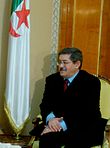| ||||||||||||||||||||||||||||
| ||||||||||||||||||||||||||||
All 389 seats to the People's National Assembly 195 seats were needed for a majority | ||||||||||||||||||||||||||||
|---|---|---|---|---|---|---|---|---|---|---|---|---|---|---|---|---|---|---|---|---|---|---|---|---|---|---|---|---|
| ||||||||||||||||||||||||||||
| ||||||||||||||||||||||||||||
 |
|---|
| This article is part of a series on the politics and government of Algeria |
Constitution |
Legislative elections were held in Algeria on 17 May 2007. [1] 24 political parties and around 100 independent lists with a total of more than 12,000 candidates competed for the 389 seats in the National People's Assembly. While most Algerians voted on May 17, immigrants from Algeria to other countries (especially France) and Algerians living in the Sahara (i.e. Southern Algeria) and other nomads and semi-nomads voted on May 16 due to the distance from Algiers, the country's capital.

Algeria, officially the People's Democratic Republic of Algeria, is a country in the Maghreb region of North Africa. The capital and most populous city is Algiers, located in the far north of the country on the Mediterranean coast. With an area of 2,381,741 square kilometres (919,595 sq mi), Algeria is the tenth-largest country in the world, and the largest in Africa. Algeria is bordered to the northeast by Tunisia, to the east by Libya, to the west by Morocco, to the southwest by the Western Saharan territory, Mauritania, and Mali, to the southeast by Niger, and to the north by the Mediterranean Sea. The country is a semi-presidential republic consisting of 48 provinces and 1,541 communes (counties). It has the highest Human development index of all non-island African countries.

France, officially the French Republic, is a country whose territory consists of metropolitan France in Western Europe and several overseas regions and territories. The metropolitan area of France extends from the Mediterranean Sea to the English Channel and the North Sea, and from the Rhine to the Atlantic Ocean. It is bordered by Belgium, Luxembourg and Germany to the northeast, Switzerland and Italy to the east, and Andorra and Spain to the south. The overseas territories include French Guiana in South America and several islands in the Atlantic, Pacific and Indian oceans. The country's 18 integral regions span a combined area of 643,801 square kilometres (248,573 sq mi) and a total population of 67.3 million. France, a sovereign state, is a unitary semi-presidential republic with its capital in Paris, the country's largest city and main cultural and commercial centre. Other major urban areas include Lyon, Marseille, Toulouse, Bordeaux, Lille and Nice.

The Sahara is a desert located on the African continent. It is the largest hot desert in the world, and the third largest desert overall after Antarctica and the Arctic. Its area of 9,200,000 square kilometres (3,600,000 sq mi) is comparable to the area of China or the United States. The name 'Sahara' is derived from a dialectal Arabic word for "desert", ṣaḥra.
At 35% of the 18.7 million [2] voters, the turnout was the lowest in Algerian history. [3] [4] Several political organisations, notably the Front of Socialist Forces, [5] the ex-communist Democratic and Social Movement, [6] leading members of the former Islamic Salvation Front (Abbassi Madani [7] and Ali Belhadj), the main faction of the split Islamist Islah Party, [8] and the newly formed organisation Rachad, [9] had called on their supporters to boycott these elections. These political groups claimed that the elections were consistently rigged by the government, and that participation merely lent a fundamentally corrupt process undeserved legitimacy.

Democratic and Social Movement is a political party in Algeria that was founded in 1966.

The Islamic Salvation Front was a Sunni Islamist political party in Algeria. The party had two major leaders representing its two bases of its support. Abbassi Madani appealed to pious small businessmen, and Ali Belhadj appealed to the angry, often unemployed youth of Algeria.
Dr. Abbassi Madani was born 28 February 1931 at Diyar Ben Aissa, Sidi Okba. He was the President of the Islamic Salvation Front in Algeria. As its leader he became the voice of a large part of the dispossessed Algerian youth.
The only notable remaining armed group in Algeria, the Al-Qaeda Organization in the Islamic Maghreb, issued a video calling participation in the elections "a great sin", adding its voice to the boycott calls. Tight security measures were implemented to protect the elections; however, two bombs exploded in Constantine the day before the election, killing a police officer and wounding five others. [10]

Constantine, also spelled Qacentina or Kasantina, is the capital of Constantine Province in northeastern Algeria. During Roman times it was called Cirta and was renamed "Constantina" in honor of emperor Constantine the Great. It was the capital of the French department of Constantine until 1962. Located somewhat inland, Constantine is about 80 kilometres from the Mediterranean coast, on the banks of the tiny Rhumel River.
Said Bouchair, the head of the national commission of legislative election control, initially reported that ballot boxes in some areas were being stuffed with FLN ballots, that observers were being prevented from attending, and that some areas refused to open ballot boxes before voting began to allow observers to see whether they were empty or not. He then retracted his statement and apologised. [11] About 15% of ballots were spoiled.
The Constitutional Council confirmed the results of the election, with slight changes to the voter turn-out rate and number of seats won by some parties, on May 21. [12] It rejected appeals regarding the election on May 30. [13]












